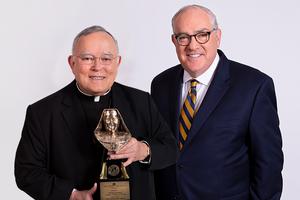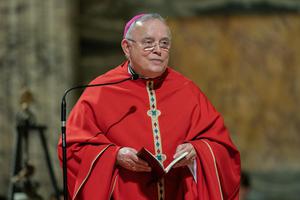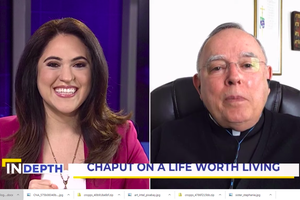Archbishop Chaput to Celebrate Memorial Mass for Terri Schiavo Anniversary
In the 12 years since her death, advocates for the disabled and vulnerable say these populations have become even more at risk of suffering the same fate.
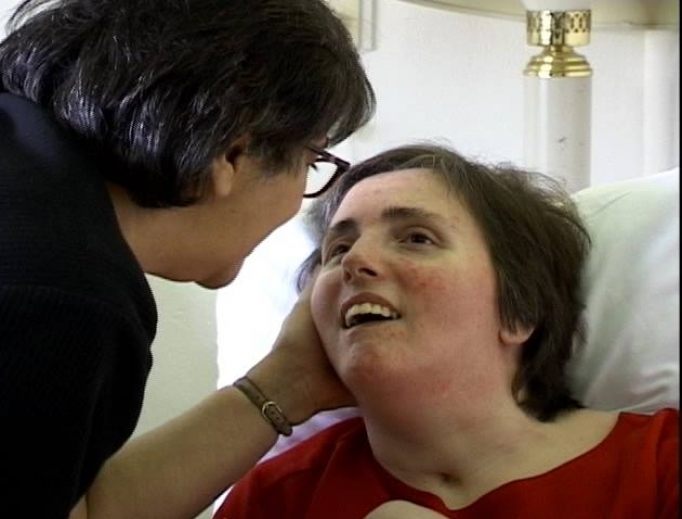
PHILADELPHIA — Philadelphia Archbishop Charles Chaput on April 7 will celebrate a televised memorial Mass at EWTN’s chapel in Irondale, Alabama, for Terri Schiavo, who starved to death in a Florida hospital March 31, 2005.
To this day, millions of people, including her family, believe that Terri Schiavo was a victim of a gross miscarriage of justice and further proof of the increasingly utilitarian attitude toward life in the United States.
In 1990, at age 29 and for still uncertain reasons, Terri collapsed from a heart attack while at home with her husband Michael. Because of the subsequent lack of oxygen to her brain, she suffered catastrophic brain damage and was left comatose, at least for a period.
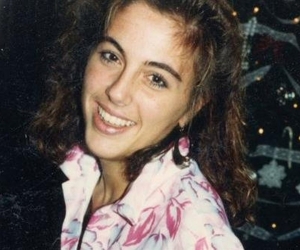
After her husband gradually lost interest in caring for her, Terri’s family, the Schindlers, moved to Florida to tend to her. While certainly brain injured, she did not suffer from anything that would have ended her life, as witnessed by the fact that she lived for 15 years subsequent to the 1990 heart attack. Unresolved debate still exists as to whether she was in a persistent vegetative state (PVS) or a mildly conscious state (MCS).
Claiming his wife had once said she never wanted to live as an invalid, Michael began petitioning the courts to remove her feeding tube in 1998. Thus began a seven-year legal battle.
In 2005, Pinellas County Judge George Greer ordered removal of Schiavo’s feeding tube on March 18. Both President George W. Bush and his brother, then-Florida Gov. Jeb Bush, took extraordinary legal measures to keep Terri alive, and even the Vatican appealed for the sparing of Terri’s life. None of these efforts succeeded, and she died of “marked dehydration.”
Archbishop Chaput, then of Denver, in a March 22, 2005, statement, said, “… in the shadow of Holy Week and Easter, the Schiavo case does have wider implications. Cardinal Renato Martino, president of the Pontifical Council for Justice and Peace, has already expressed his fear that allowing Ms. Schiavo to starve would be ‘a grave step toward the legal approval of euthanasia in the United States.’ He speaks for many other concerned persons around the world.”
“Removing food and water from a patient can only be justified if the person is terminal and natural death is imminent,” he said. “For disabled persons not in imminent danger of death and able to breathe on their own, starvation and dehydration to provoke death amount, in effect, to a form of murder. Such actions attack the sanctity of human life. They reject any redemptive meaning to suffering. They can never be justified.”
Vulnerable Populations
In the 12 years since her death, advocates for the disabled and vulnerable say these populations have become even more at risk of suffering the same fate.
Last summer, a comatose Pennsylvania woman overdosed and came perilously close to dying through the removal of nutrition. Only a court injunction saved her life. In the same period, an almost identical case occurred in Wisconsin.
In an April 2011 article in Current Oncology, Dr. José Pereira, palliative care physician at The Ottawa Hospital in Ottawa, Canada, wrote, “[A]bout 900 people annually are administered lethal substances without having given explicit consent, and in one jurisdiction, almost 50% of cases of euthanasia are not reported.”
Speaking to the Register, Schiavo’s brother, Bobby, says this is happening “every day, more than once [a day].”
“[T]he empirical evidence of 12 years shows where it’s legal to withdraw or withhold food or hydration, the medically vulnerable are being killed every day,” he said. “It’s chilling. The general public has no idea the extent to which this is happening. Most groups are focusing on the assisted suicide issue, which is great. But there are exponentially more people being killed by withdrawal of food and hydration than who are by assisted suicide.”
Indeed, most Americans conflate physician assisted suicide with euthanasia, although as Father Tad Pacholczyk of the National Catholic Bioethics Center (NCBC) said, they “are different, with one being suicide, the other direct killing.”
But, he observed, one can lead to the other.
“That’s how it occurred in the Netherlands,” Father Pacholczyk said. “In Oregon, where assisted suicide has been legal for several years, there is a now a new initiative to expand the practice into euthanasia. The two practices are different, and one often serves as preparation for the other.”
As for assisted suicide, it has become more available in the years since Terri’s death. It was already legal in Oregon, the Netherlands, Switzerland and Belgium. It has since become lawful in Canada, Colombia, and the states of Washington, Vermont, Colorado, California and the District of Columbia.
New Mexico and Montana allow it by court order, and Hawaii and Nevada are actively pursuing legalization. (In 36 states, the practice is outlawed, but 20 states are considering decriminalization.)
Additionally, the American Medical Association is actively debating changing its stance on the procedure from opposed to neutral.
In her letter to the AMA opposing this, Marie Hilliard of the NCBC wrote, “There is growing evidence with reimbursement policies that providing the drug for enabling physician assisted suicide will be funded when treatment protocols are not,” a contention seemingly born out by the British newspaper Independent.
“It’s all under the umbrella of cost containment,” said Schindler. As for this year’s commemoration of his sister’s life, Schindler told the Register, “Our hope is to do this in the coming years, as well. I don’t know if will always be with Archbishop Chaput, but the idea is to keep at the forefront the importance of what [her death] means, not only for Terri, but so many other people being killed the way she was killed. It’s expanding more and more. It’s not hyperbole. It’s true. More people are being euthanized.”
“I don’t want to paint the picture that our entire health system has gone in this direction,” he continued, “but it’s harder and harder to find facilities that will look out for our best interests. There are wonderful doctors and nurses and facilities, but they’re becoming harder to find. So people need strong advocates who won’t be intimidated by hospitals and doctors and will push for the patient’s rights, because we all have them. Doctors can come in and make it seem like their word is final, but it’s not the case. People need to protect themselves.”
Register correspondent Brian O’Neel writes from Coatesville, Pennsylvania.
INFORMATION
The Holy Mass in Memory of Terri Schiavo will be televised live on EWTN at 8am Eastern on EWTN Friday, April 7. It will re-air at noon and 7pm.






